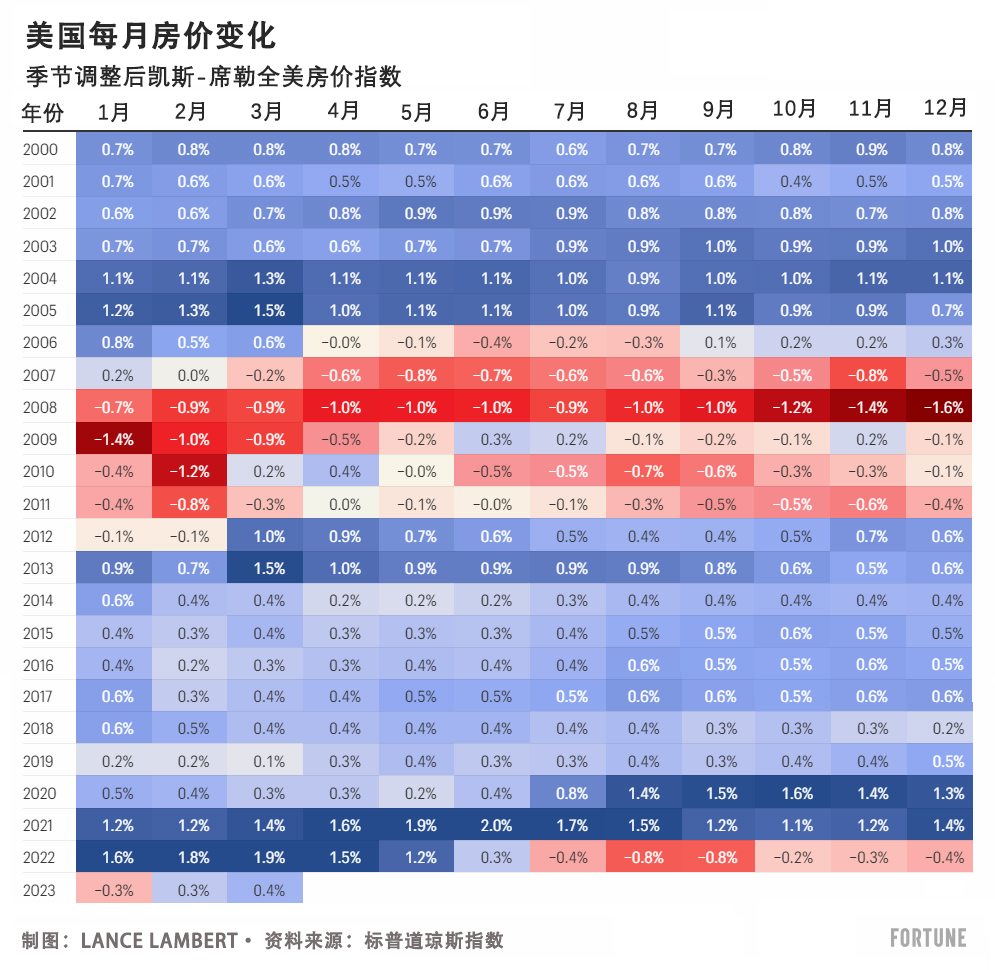
毋庸置疑,商业地产市场不容乐观,尤其是办公楼领域。
最近纽约大学(New York University)和哥伦比亚大学(Columbia University)的研究人员本月早些时候发布的修改预测认为,仅纽约市办公楼的价格到2029年就会暴跌高达44%。这远高于研究人员一年前发布的预测。当时他们预测到2029年,纽约市办公楼的价格将暴跌28%。
持续的远程办公和加息,以及许多商业地产贷款到期,成为人们不看好商业地产的根本原因。然而,至少特斯拉(Tesla)CEO埃隆·马斯克认为,房价下跌潮将很快蔓延到商业地产以外的市场。
上周一,马斯克发推文暗示,住宅房地产即将下跌。他表示:“美国商业地产价格正在快速暴跌。接下来就是住宅价格。”
马斯克并未解释他认为美国房价会有多大降幅,以及他认为房价下跌的原因。也有人反驳了他的观点。
上周二,Redfin CEO格伦·凯尔曼发推文反驳马斯克称:“商业地产需求下降却能促进住宅地产的需求。居家办公者需要家中有更多空间。销量下降的原因是住宅存量在下降。现在, 房价已经连续两个月上涨。”
去年,旧金山联邦储备银行(Federal Reserve Bank of San Francisco)的研究人员发布的一项研究,为疫情期间远程办公刺激房价这种观点提供了佐证。旧金山联储的论文称,到2021年11月疫情期间的房地产市场繁荣,超过50%可以归因于疫情导致的远程办公趋势所带来的对“空间”的需求增长。
旧金山联储的研究人员写道:“我们的研究结果显示,疫情期间的房价上涨体现的是基本面的变化,而不是投机泡沫。这意味着远程办公的发展,可能是未来住房成本和通胀的重要决定因素。”

那么,凯尔曼和马斯克,谁的预测会是准确的?房地产行业内部存在巨大分歧。
虽然季节调整后Case-Shiller全美房价指数显示,全美房价小幅下跌,较2022年6月下跌了2.2%,但房地产市场并未全面崩盘。旧金山(较2022年最高点下跌12.9%)、凤凰城(下跌8.4%)和拉斯维加斯(下跌9.0%)等市场房价大幅下跌。然而,在中西部的芝加哥等许多城市以及迈阿密等东海岸城市,房价依旧接近史上最高水平。
Zillow和CoreLogic等公司的经济学家们认为,全美房价已经触底,但穆迪分析(Moody's Analytics)和房利美(Fannie Mae)等公司却认为,全美房价将很快上涨进入调整期。据Case-Shiller指数显示,2月和3月的全美房价环比上涨。(财富中文网)
翻译:刘进龙
审校:汪皓
毋庸置疑,商业地产市场不容乐观,尤其是办公楼领域。
最近纽约大学(New York University)和哥伦比亚大学(Columbia University)的研究人员本月早些时候发布的修改预测认为,仅纽约市办公楼的价格到2029年就会暴跌高达44%。这远高于研究人员一年前发布的预测。当时他们预测到2029年,纽约市办公楼的价格将暴跌28%。
持续的远程办公和加息,以及许多商业地产贷款到期,成为人们不看好商业地产的根本原因。然而,至少特斯拉(Tesla)CEO埃隆·马斯克认为,房价下跌潮将很快蔓延到商业地产以外的市场。
上周一,马斯克发推文暗示,住宅房地产即将下跌。他表示:“美国商业地产价格正在快速暴跌。接下来就是住宅价格。”
马斯克并未解释他认为美国房价会有多大降幅,以及他认为房价下跌的原因。也有人反驳了他的观点。
上周二,Redfin CEO格伦·凯尔曼发推文反驳马斯克称:“商业地产需求下降却能促进住宅地产的需求。居家办公者需要家中有更多空间。销量下降的原因是住宅存量在下降。现在, 房价已经连续两个月上涨。”
去年,旧金山联邦储备银行(Federal Reserve Bank of San Francisco)的研究人员发布的一项研究,为疫情期间远程办公刺激房价这种观点提供了佐证。旧金山联储的论文称,到2021年11月疫情期间的房地产市场繁荣,超过50%可以归因于疫情导致的远程办公趋势所带来的对“空间”的需求增长。
旧金山联储的研究人员写道:“我们的研究结果显示,疫情期间的房价上涨体现的是基本面的变化,而不是投机泡沫。这意味着远程办公的发展,可能是未来住房成本和通胀的重要决定因素。”
那么,凯尔曼和马斯克,谁的预测会是准确的?房地产行业内部存在巨大分歧。
虽然季节调整后Case-Shiller全美房价指数显示,全美房价小幅下跌,较2022年6月下跌了2.2%,但房地产市场并未全面崩盘。旧金山(较2022年最高点下跌12.9%)、凤凰城(下跌8.4%)和拉斯维加斯(下跌9.0%)等市场房价大幅下跌。然而,在中西部的芝加哥等许多城市以及迈阿密等东海岸城市,房价依旧接近史上最高水平。
Zillow和CoreLogic等公司的经济学家们认为,全美房价已经触底,但穆迪分析(Moody's Analytics)和房利美(Fannie Mae)等公司却认为,全美房价将很快上涨进入调整期。据Case-Shiller指数显示,2月和3月的全美房价环比上涨。(财富中文网)
翻译:刘进龙
审校:汪皓
There’s no doubt about it: Things aren’t looking so great for commercial real estate, especially for office space.
Look no further than a revised forecast issued earlier this month by a group of researchers from New York University and Columbia University, which predicts that office values in New York City alone will plummet a staggering 44% by 2029. That’s much steeper than the group’s prior prediction—issued a year ago—for NYC office values to fall 28% by 2029.
The stickiness of remote work, coupled with interest rates spiking just as many commercial real estate loans come due, is the underlying source of the commercial real estate bearishness. However, at least in the eyes of Tesla CEO Elon Musk, property declines will soon spread beyond commercial real estate.
On Monday, Musk insinuated that pain awaits the residential housing market when he tweeted that “Commercial real estate is melting down fast. Home values next.”
Musk didn’t say how much he thinks U.S. home prices will fall—nor did he explain why. He also got some pushback.
On Tuesday, Redfin CEO Glenn Kelman shot back at Musk, tweeting, “But the loss in demand for commercial real estate is what’s driving demand for residential real estate. People who work from home need more space at home. Sales volume is down because inventory is down. Today, home prices increased for a second straight month.”
The idea that remote work has boosted home prices during the pandemic is supported by research published last year by researchers at the Federal Reserve Bank of San Francisco. The San Francisco Fed paper argues that upwards of 50% of Pandemic Housing Boom gains through November 2021 can be attributed to an elevated demand for “space” created by the pandemic’s remote work shift.
“Our results suggest that rising house prices over the pandemic reflected a change in fundamentals rather than a speculative bubble. This implies that the evolution of remote work may be an important determinant of future housing costs and inflation,” wrote the team of San Francisco Fed researchers.
So who is right, Kelman or Musk? The industry is fairly divided.
While national home prices have fallen a bit—down 2.2% from June 2022 according to the seasonally adjusted Case-Shiller National Home Price Index—they aren't crashing broadly. Some markets like San Francisco (down 12.9% from its 2022 peak), Phoenix (down 8.4%), and Las Vegas (down 9.0%) have fallen sharply. However, many places in the Midwest, like Chicago, and along the East Coast, like Miami, are still near all-time highs.
Economists at firms like Zillow and CoreLogic argue that national home prices have bottomed, while firms like Moody's Analytics and Fannie Mae think that national home prices—which rose on a month-over-month basis in February and March according to Case-Shiller—will soon flip back into correction.






